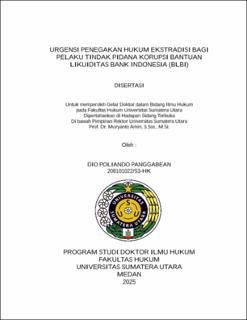| dc.description.abstract | Extradition requests are based on national legislation, extradition treaties, expanded conventions and international customs. If there is a request for extradition outside of the rules mentioned above, then extradition can be carried out on the basis of good relations with another country, either for reciprocal or unilateral interests. Based on the background discussed, 3 problems can be drawn as follows: why legal regulations for cooperation between countries have not been able to extradite perpetrators of criminal acts of corruption in Indonesia, what is the mechanism for enforcing extradition law in Indonesia for the perpetrators of criminal acts of corruption, what is the urgency of implementing extradition cooperation between Indonesia and Singapore? in law enforcement for the perpetrators of criminal acts of corruption with Indonesian Bank Liquidity Assistance (BLBI). This type of research is normative juridical, so the approach taken is a statutory approach and a comparative approach. The research sources used are primary and secondary legal materials. The data collection technique is through library research.
Based on the research results, it can be concluded that there is a need for a mechanism and synergy between law enforcement officers across countries and a renewal of the legal basis for extradition. The urgency of extradition cooperation is based on the mandate of the philosophical basis of the 1945 Constitution and its derivatives. There are differences in legal systems so that legal efforts must be increased to implement the extradition agreement. Referring to the sociological basis, the government must reflect the moral responsibility and sovereignty of the state constitution in realizing the supremacy of law.
With the extradition agreement that has been ratified by the Republic of Indonesia, extradition regulations cannot yet be implemented due to procedural constraints, commitments and legal obstacles, institutional reformulation and changes in the nomenclature of the ministry. The extradition mechanism goes through 3 stages, namely the pre-, process and implementation stages of extradition. The urgency of extradition is based on the philosophical basis, the legal basis and the sociological basis which have legal impacts with the ratification of extradition so that the government can extradite perpetrators of corruption who are abroad. | en_US |


